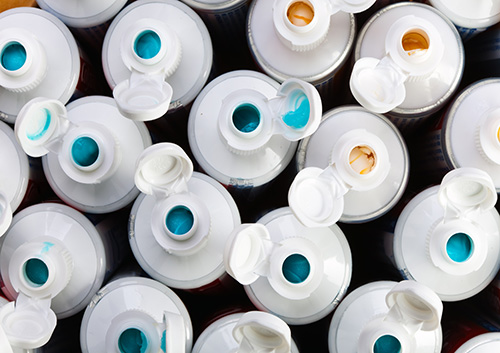January 28th, 2026

Between the huge number of toothpaste brands on the market today, the different flavors, and claims from most to do different things, it isn’t surprising that people feel so confused when it comes to something that should be as simple as buying a tube of toothpaste. This guide will help you identify the common ingredients in toothpaste, and help you understand the important factors to consider before buying toothpaste again.
Toothpaste comes in gel, paste, and powdered forms. When it comes to the type of toothpaste, the choice is more a matter of preference.
Basic Ingredients
- Abrasive Agents – Abrasive agents are the scratchy substances added to toothpastes to help in the removal of food particles, bacteria, and minor stains. Calcium carbonate is one of many abrasive materials, and arguably the most common.
- Flavor – When toothpastes are flavored, they almost always have artificial sweeteners to enhance the flavor of the toothpaste and increase the likelihood that you’ll use it. Flavors run the gamut from traditional mint to cinnamon that may appeal to adults, and bubble gum or lemon lime – flavors to target children.
- Humectants – Humectants are moisturizing agents that keep paste and gel toothpastes from drying out. Glycerol is commonly used as a humectant.
- Thickeners – Thickeners are used to give toothpaste its distinctive consistency, and to make it maintain a uniform consistency and come out of the tube easily.
- Detergents – Sodium lauryl sulfate is the most common detergent used in products that foam up, like toothpaste does in your mouth.
What to Look For in Toothpaste
Fluoride is naturally occurring mineral. It is the most important ingredient to look for in a toothpaste. Although there are people who argue against using fluoride toothpaste, dental professionals like Dr. Ford and Dr. Guter emphasize that the fact that the incidence of tooth decay has decreased so significantly in the past 50 years is because of fluoridated toothpaste.
The suggestion that fluoridated water gives you enough fluoride to protect your teeth is wrong. Fluoride toothpaste is the best cavity protection there is. In addition to strengthening tooth enamel and protecting teeth from acid erosion (from acidic foods and drinks,) it remineralizes the surfaces of teeth that are suffering from early acid damage and may prevent developing tooth decay from worsening.
Tartar Control
Tartar is the result of hardened plaque buildup on the teeth. Good oral hygiene and in between twice yearly cleanings from a dental hygienist are the best defense against plaque buildup. Plaque turns to tartar when people neglect their oral hygiene. Over time, tartar can build up on teeth and under the gums, increasing the risk of gum disease.
Your best bet is to use a toothpaste that has a combination of anti-plaque agents. Products containing more than one plaque reducer may be more effective than products that only one. Common ingredients to look for are zinc citrate or pyrophosphates. Triclosan is an antibiotic that is believed to kill bacteria in the mouth, and it can be found in some anti-plaque toothpaste.
Look for toothpaste that bears the seal of the American Dental Association. That seal is an endorsement of the ADA – and it means that many dentists agree that that particular toothpaste does what toothpaste is designed to do. We can also recommend toothpaste to meet your specific oral health concerns at your next visit to our Virginia Beach, VA office.
January 21st, 2026

Today’s braces have come a long way. Braces are less conspicuous, easier to keep clean, and, often, treatment takes less time than it did in the recent past. With early intervention and modern treatment techniques, orthodontists are able to help make your orthodontic journey more confident, carefree, and efficient.
Even with all of the benefits of modern orthodontics, though, there are still some reasons that a tooth should be extracted to give a patient the best, healthiest alignment and bite. When might your orthodontist recommend an extraction?
- Large teeth and/or a small jaw can mean that there’s just not enough space for your overcrowded teeth.
- The placement of a tooth or teeth make it impossible to correct a bite problem.
- Your wisdom teeth are impacted or erupting, and are likely to interfere with your bite and/or crowd your teeth.
- You have an extra, or supernumerary, tooth—a rare occurrence which can cause crowding, tooth displacement, or even block a healthy adult tooth from erupting.
If your orthodontist recommends extraction, it makes a lot of sense to ask for a referral to an oral and maxillofacial surgeon like Dr. Ford and Dr. Guter. Why an oral surgeon?
- Anything other than a simple extraction requires surgical treatment, and your oral surgeon has spent years of additional specialized medical study and training after dental school focusing specifically on facial, jaw, and dental surgeries.
- Oral surgeons know how to deal with complicated extraction issues and potential complications. Teeth that lie close to a nerve, teeth that are impacted, or teeth with long, curved roots most often mean that surgical extractions are the best and safest options.
- Your oral and maxillofacial surgeon is trained to administer all forms of anesthesia, including not only local anesthesia but a variety of sedation options as well. You can decide on the method that will make you most comfortable.
- Oral surgeons have a wealth of experience in extractions, whether simple or complicated, because this procedure is performed regularly in their offices.
If your orthodontist has recommended an extraction in order to achieve your healthiest bite and alignment, ask about our Virginia Beach, VA oral and maxillofacial surgery office.
January 14th, 2026

Our pets are a valued part of the family, but dogs and cats are not regularly known for their minty-fresh breath. Did you know that bad breath can be a sign of a more serious dental problem for your furry companion?
If you live with a pet or two, you’ll want to brush up on your animal dental knowledge and make sure everyone’s teeth stay healthy.
Proper dental care is essential to a pet’s overall well-being. About 80 percent of dogs and 70 percent of cats suffer from periodontal disease after the age of three.
Not only is this unhealthy for their mouth, it can lead to more serious health problems, including organ damage and heart failure. Toxins from periodontal disease seep into your pet’s bloodstream and have the potential to cause fatal organ damage.
Your veterinarian will check your pet’s teeth at an annual or six-month examination, but here are a few signs of periodontal disease you should watch for at home:
- Yellow/brown tartar
- Foul breath
- Red, inflamed, or bleeding gums
- Excessive drooling
- Pawing at the mouth or rubbing one’s jaw against objects
- Difficulty chewing
Aside from regular checkups at the vet, the best thing you can do for your pet is brush its teeth daily. Bacteria can recolonize onto the surface of teeth within 24 to 36 hours, so it’s essential to remove plaque before it turns into tartar. Ask your vet for a recommended toothbrush and pet toothpaste.
Dental hygiene chews can also help to reduce the effects of gingivitis, but some chews can actually make your pet’s oral health worse. Treats such as cow hooves, pig’s ears, and animal bones can damage teeth and cause other problems if ingested. Your vet can help you choose items that are healthiest for your pet.
Your dog’s favorite toys may also pose a threat to their oral health. Abrasive toys such as the popular green tennis balls can create wear and tear on the surface of pets’ teeth.
As with your own teeth, your dog or cat’s oral health plays a large role in its overall health. Remember to schedule regular checkups and ask your veterinarian for more tips on how to care for your pet’s teeth most effectively.
January 7th, 2026

As you probably know, you can always connect with Dr. Ford and Dr. Guter and our team by calling our Virginia Beach, VA office, or going to our Facebook page. However, if you’ve recently moved or gotten a new phone number, we’ll need to update our records so we can easily connect with you!
If any of your contact information has changed, please let our team at Oral Surgery of Tidewater know, just in case we need to reach you. While you’re at it, you can also schedule your next appointment! We look forward to hearing from you!






 Website Powered by Sesame 24-7™
Website Powered by Sesame 24-7™